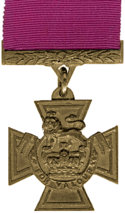- Charles Doughty-Wylie
-
Charles Hotham Montagu Doughty-Wylie 
Born 23 July 1868
Theberton, SuffolkDied 26 April 1915
Gallipoli, TurkeyAllegiance  United Kingdom
United KingdomService/branch  British Army
British ArmyYears of service 1889 - 1915 Rank Lieutenant Colonel Unit Somaliland Camel Corps
The Royal Welch FusiliersBattles/wars Mahdist War
Chitral Expedition
1898 Occupation of Crete
Second Boer War
Boxer Rebellion
Third Somaliland Expedition
World War IAwards Victoria Cross
Order of the Bath
Order of St Michael and St George
Order of the Medjidie (Turkey)Lieutenant Colonel Charles Hotham Montagu Doughty-Wylie VC, CB, CMG (23 July 1868 - 26 April 1915) was an English recipient of the Victoria Cross, the highest and most prestigious award for gallantry in the face of the enemy that can be awarded to British and Commonwealth forces. Charles Hotham Montagu Doughty-Wylie was also the recipient of the Order of the Medjidie from the very Turkish Government he later would fight against.
A native of Suffolk, Doughty-Wylie was a 1889 graduate of the Royal Military Academy, Sandhurst. His military career included the Chitral Expedition (1895), 1898 Occupation of Crete, the Mahdist War (1898–99), the Second Boer War, the Boxer Rebellion (1900) and Somaliland (1903–04) where he commanded a unit of the Somaliland Camel Corps.
Contents
Turkish Revolution
Colonel Doughty-Wylie was the British consul in Mersina, Turkey, during the Turkish revolution of 1909. Richard Bell-Davies (later a VC winner, then a lieutenant on the battleship HMS Swiftsure) met him at the time and gives an account in his autobiography Sailor in the Air (1967).
Massacres of Armenians started along with the revolution, and Bell-Davies says that it was largely due to the efforts of Doughty-Wylie that these were halted in Mersina. Doughty-Wylie then went to Adana, forty miles away. He persuaded the local Vali (Governor) to give him a small escort of Turkish troops and a bugler and with these managed to restore order. Mrs. Doughty-Wylie turned part of the dragoman's house into a hospital for wounded Armenians. Bell-Davies says that by the time an armed party from Swiftsure arrived, Doughty-Wylie had again almost stopped the massacre single-handedly. Newspaper reports of the period record that Doughty-Wylie was shot in the arm, while trying to prevent these massacres.[1]
Charles Hotham Montagu Doughty-Wylie was the recipient of the Order of the Medjidie from the Turkish Government. He was awarded the Medjidie because of his work during the Balkan Wars when he served with the British Red Cross helping the Turkish Military. He is the only soldier to have been awarded military honors by both the British Empire and the Ottoman Empire.[2][dubious ]
World War I
Doughty-Wylie was 46 years old, and a lieutenant colonel in The Royal Welch Fusiliers, British Army when, "owing to his great knowledge of things Turkish" according to Bell-Davies, he was attached to General Sir Ian Hamilton's headquarters staff of the Mediterranean Expeditionary Force during the Battle of Gallipoli.
On 26 April 1915, following the landing at Cape Helles on the Gallipoli peninsula, during which the brigadier general and the brigade major had been killed, Lieutenant Colonel Doughty-Wylie and another officer (Garth Neville Walford) organized and made an attack through and on both sides of the village of Sedd-el-Bahr on the Old Fort at the top of the hill. The enemy's position was very strongly entrenched and defended, but mainly due to the initiative, skill and great gallantry of the two officers the attack was a complete success.
Both were killed in the moment of victory. Doughty-Wylie was shot in the face by sniper and died instantly. Doughty-Wylie is buried close to where he was killed. His grave is the only solitary British or Commonwealth war grave on the Gallipoli peninsula: The Turkish authorities moved the graves of all other foreign soldiers to the "V Beach" graves except for his.[3]
His Victoria Cross is displayed at the Royal Welsh Fusiliers Museum in Caernarfon Castle, Gwynedd, Wales.
Personal life
Doughty-Wylie, a married man, had an unconsummated affair with Gertrude Bell with whom he exchanged love letters from 1913-1915 until his death. Bell was an eminent English writer, traveller, political officer, administrator, and archaeologist who explored, mapped in Greater Syria, Mesopotamia, Asia Minor, and Arabia.[4]
References
- ^ "WOMAN DESCRIBES RIOT AT ADANA.". The New York Times. 3 May 1909. http://query.nytimes.com/gst/abstract.html?res=9E0DE5D71738E033A25750C0A9639C946897D6CF&scp=1&sq=Adana+Armenians+Minaret&st=p.
- ^ http://www.stargazete.com/guncel/turkleri-cok-seviyordu-sahile-silahsiz-cikmisti-haber-256544.htm
- ^ CWGC entry
- ^ Liora Lukitz, pp. 14-17
- Monuments To Courage (David Harvey, 1999)
- The Register of the Victoria Cross (This England, 1997)
- VCs of the First World War - Gallipoli (Stephen Snelling, 1995)
External links
Categories:- 1868 births
- 1915 deaths
- British Gallipoli Campaign recipients of the Victoria Cross
- Royal Welch Fusiliers officers
- British Army personnel of World War I
- Companions of the Order of the Bath
- Companions of the Order of St Michael and St George
- British military personnel killed in World War I
- Sandhurst graduates
- British military personnel of the Chitral Expedition
- British Army personnel of the Mahdist War
- British Army personnel of the Second Boer War
- British military personnel of the Third Somaliland Expedition
- Shooting survivors
- Royal Navy personnel of the Boxer Rebellion
- People from Suffolk Coastal (district)
- Somaliland Camel Corps officers
- British diplomats
- British military personnel of the 1898 Occupation of Crete
Wikimedia Foundation. 2010.
